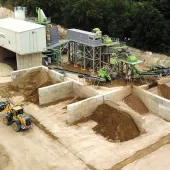J.A. Jackson build a sustainable future with CDE
Lancashire firm invests in new wash plant solution to meet increased demand for recycled aggregates
J.A. Jackson, part of the Fox Group, have installed their third major project with wet processing experts CDE which will see them produce more than 10,000 tonnes of washed material a week.
Established in 1967, J.A. Jackson are suppliers of building materials, aggregates and ready-mix concrete, as well as providing skip hire and haulage services. Working out of sites in Preston, Leyland and Lancaster, the company supplies both quarried and recycled aggregates, but increased demand for their products has boosted the need for more material recovery.
The family-run business has been working with CDE since 2010 when the first wash plant was installed at the company’s 90-acre site in Fullwood, to process between 80–120 tonnes/h. Over the years, this has gradually been upgraded to 150 tonnes/h.
Due to their long-standing relationship, J.A. Jackson had confidence in CDE’s expertise to design a solution which would increase the amount of material they could process to meet current market demands.
Commenting on the relationship, David Scott, health, safety and operations manager at J.A. Jackson, said: ‘There are several reasons why we’re continuing our partnership with CDE. First, is that we’ve always been delivered a solution to suit business needs and received great support from the local team to ensure the smooth operation and development of our plant.
‘When we bought the plant in 2010, we were told to expect a 10-year life span. The plant has already outlasted that at 13 years, so we know CDE’s solution is designed to last. Some of the team commissioning our new plant had worked on the first one in 2010, and we were really reassured working with a team that we knew understood our site.’
At the centre of J.A. Jackson’s decision making is sustainability. In recent years, the company has seen increased demand for recycled aggregates as opposed to virgin limestone materials.
Mr Scott commented: ‘Five or six years ago, recycled aggregates were considered second rate. Customers would prefer to pay the extra £2 per tonne to use virgin limestone materials. That landscape has completely changed and now we have a large demand for our recycled materials.
‘Our single-size aggregates and sand have proven to be very popular. We also produce a recycled Type 1 MOT from the clean oversize from the wash plant, giving a higher-quality product when compared with dry processing. We are confident in the quality of our recycled products and trials have shown the quality to be equal to virgin materials.’
J.A. Jackson also chose to continue partnering with CDE as it was more sustainable for their business, as Mr Scott explained: ‘We have been able to retain the main feed conveyor and aggregates processing section with the additional plant. CDE were able to design a plant to seamlessly integrate the elements we could keep from the original plant, which is a much more sustainable solution for us and a large part of the reason for working with them again.’
In order to meet increased demands and to serve the changing market landscape, CDE have designed a solution which can process more than 200 tonnes/h, an increase from 120 tonnes/h with the existing plant, resulting in more than 10,000 tonnes being washed through the plant each week.
The new 200 tonnes/h solution integrates an EvoWash sand wash plant, AquaCycle A600 thickener, and a screen, with the further addition of an R4500 primary scalping screen once the upgraded solution was operational.
The plant is producing six final products (two sands: 0–2mm and 0–4mm; and four aggregates: 10mm, 10–20mm, 20–40mm and oversize) as well as filter cake. With the new plant, 85% of the feed material is being repurposed in the local construction industry, limiting the amount of waste being sent to landfill.
The J.A. Jackson facility has an abundance of feed material from the local area, much of which is brought in by the 400 tipper wagons which form part of the Fox Group’s fleet. The material is processed through the wash plant (washed and grades in 3mins) and the wagons leave with washed sand and aggregates, so as well as diverting material from landfill, there are also fewer empty transport runs.
J.A. Jackson are 45 minutes from the local stone quarries in Cumbria, so by increasing capacity they are helping to further reduce the carbon footprint of material movements by providing a source of aggregates to the local construction sector.
David Kinloch, director of business development at CDE, said: ‘It’s been a pleasure working with J.A. Jackson over the years to build a solution that aligns with their sustainability goals. Plants like this are the future of the industry and a testament to J.A. Jackson’s passion for diverting waste from landfill.
‘We have many customers across the UK and were able to take J.A. Jackson to visit several of our cutting-edge plants to showcase our technologies, to make sure we found a solution that suited them. We were delighted to work on their most recent journey, providing them with an innovative solution to play their part in creating a circular economy.
‘At CDE, we are committed to delivering quality products which stand the test of time. We were proud to be able to upgrade this 13-year-old plant and deliver the lowest total cost of ownership in the wet processing market.’
David Scott added: ‘Now that we’ve increased the size of the plant, we’re able to process more material which allows us to work in partnership with large construction firms. This, in turn, diverts more waste from landfill and ultimately is helping promote sustainability in our local economy.
‘CDE have delivered on what we set out to achieve and we’ve developed a very positive working relationship over the years. From the design process through to commissioning and after-sales support, we have a great ongoing relationship with CDE and have regular visits from our local customer relationship manager, who has been a great asset to ensure the smooth operation and development of our plant.’










